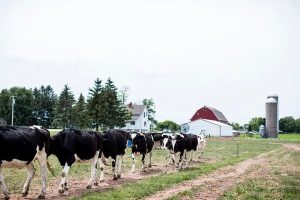
Those two plants supply the majority of eight-ounce milk cartons to school districts across Alabama.
In a statement released Thursday, Tuscaloosa City Schools said it is bracing for a milk shortage that will affect the district, along with more than 100 other school districts in Alabama when the dairy plants close.
Borden produces most of the 736,000 half pint cartons of milk to 422,000 students in Alabama each week, according to the Alabama State Department of Education’s Child Nutrition Program.
Tuscaloosa City Schools said it goes through about 35,000 half-pint cartons per week.
The Tuscaloosa City Schools’ CNP department said it is currently looking into other options in terms of milk. However, TCS CNP Director Billy Nichols said there are not any local dairy producers who can immediately replace the fresh supply that Borden was producing.
TCS said the United States Department of Agriculture, the government entity that oversees school lunch programs, was notified of the dairy closures and provided waivers to school districts to support them during the disruption.
TCS said water is always available to students and families are welcome to send milk from home with their students each day during the shortage.
TCS will serve milk from Borden through the month of September.
A Jefferson County spokesperson said the Purchasing Association of Central Alabama was informed about the plant closing in early August and the following statement was provided:
“In an effort to maintain the supply chain for milk products for our all of our PACA Partners it was determined best to publish a bid to establish a new contract. Not helping our impacted PACA partners was never an option. Our PACA Partners and the education community are extremely important and when one part of that community is impacted we do what is within our capabilities to assist. Currently, bids are being solicited publicly from interested vendors and we are thankful to all vendors who are willing to participate in the bidding process. The Jefferson County Commission Purchasing Division published Invitation To Bid 84-22 to support this effort. A copy of the bid may be obtained at https://jeffcobids.jccal.org/Search.aspx.”
Jefferson County along with Hoover City Schools each said they do not anticipate a disruption but they are making a plan just in case of a shortage.
The Alabama State Department of Education sent a message to Child Nutrition Program directors and superintendents across the state.
ALSDE recommends that you take steps now to ensure you can offer milk with all meals to students in your schools. If you have difficulty procuring milk in a timely manner and this supply chain disruption impacts your meal service, USDA has provided flexibilities through the COVID–19: Child Nutrition Response #110 Waiver to Allow Fiscal Action Flexibility for Meal Pattern Violations Related to COVID-19 Supply Chain Disruptions Impacting School Meals in School Year 2022-2023. If SFAs use this flexibility, be sure that the original menu planned for all meals includes milk. You will need to document on your production records that milk was not available due to the supply chain issues and maintain supporting documentation. ALSDE is seeking further guidance from USDA regarding milk disruption waivers. We will share this information as it becomes available.
The release also included an attached letter from The Dairy Alliance about the possibility of a milk shortage.
“Our team at The Dairy Alliance is working in collaboration with the Alabama State Department of Education to ensure all Alabama schools can procure milk for the 2022-23 (school year),” the program stated in its letter. “It would be wise to take steps now to ensure milk is available with all meals. The supply of shelf-stable milk in half-pint packaging from Diversified Foods, Inc. is sufficient to cover all districts affected by this closure and is available immediately.”

























